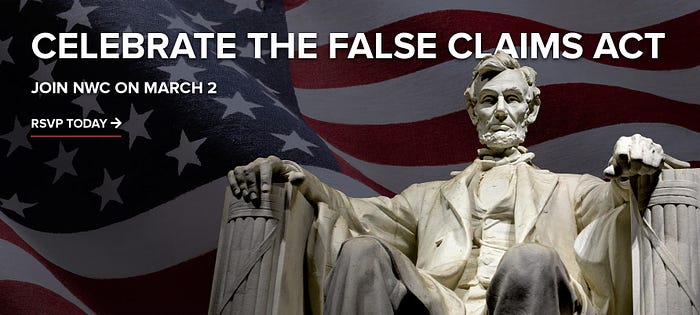Sunday Read: Concerning Trends for the False Claims Act

In a February 1 press release, the Department of Justice announced that it had collected more than $5.6 billion from lawsuits filed under the False Claims Act in Fiscal Year (FY) 2021, with $1.6 billion of this being from whistleblower lawsuits alone.
Why is the False Claims Act important?
The False Claims Act, passed in 1863 as a Civil War era defense against profiteering government contractors, serves as one of the United States’ strongest laws in preventing the misuse of public funds. Taxpayers have a vested interest in ensuring that government money is being used legally and transparently, and the FCA has made it easier for whistleblowers to come forward and report such fraud. Under the FCA, an individual or non-governmental organization can file a lawsuit in U.S. district court on behalf of the United States government. Being the first to file such a claim for a particular instance of fraud can entitle the whistleblower to between 15% and 30% of the recovered amount after a successful prosecution.
The $5.6 billion in FCA settlements and judgements collected by the DOJ in FY 2021 is significant, as it is the second-largest annual total in the history of the FCA. However, another number remained troublingly low: the total amount paid in whistleblower rewards. Despite the substantial penalties collected by the DOJ, only $237 million in awards were paid to whistleblower in FY 2021, which is the lowest since FY 2008, despite the increasing recoveries seen in the previous year.
The fraud alleged and uncovered through DOJ whistleblower claims is certainly not easy to overlook. The vast majority of FCA claims litigated by the DOJ involve fraud in the healthcare industry with heavy consequences for taxpayers.
For example, in August of 2021, medical supply company Alere paid $39 million after allegations that it had billed defective rapid tests to Medicare. Alere’s tests were being used to monitor blood coagulation in heart patients taking anti-coagulation drugs and were being used in emergency rooms. Under the FCA, a senior quality control analyst at Alere was able to file a claim against the company and receive a $5.6 million award. FCA whistleblowers can be anyone; Gregory Goodman was a call center employee when he filed his own suit against Alere, resulting in a $160 million settlement for rendering unnecessary medical services and devices to Medicare beneficiaries.
The whistleblower claims filed for FCA violations have helped bring to light faulty medical devices, unnecessary medical procedures, pharmaceutical price-fixing, kickback schemes, and other fraudulent behavior.
Individual whistleblowers filing under the False Claims Act have been instrumental in uncovering fraud in these areas. It is therefore crucial for the government to support and encourage such whistleblowers, which is why the current trend with DOJ whistleblower rewards is so concerning.
Why are we seeing this trend?
In 2015, the Supreme Court ruled on United Health Services v. United States ex rel. Escobar, a case regarding an FCA whistleblower claim. The FCA specifies that whistleblower suits must be “material” to proceed, and the court’s decision in Escobar narrowed the definition of “material”. In its opinion, the court stated that a “material” lie or omission by a government contractor would need to be egregious enough that it would cause the government to cancel the contract. However, the interpretation of this decision has been inconsistent among the lower courts.
The more extreme interpretations of Escobar have led to corporations arguing that whistleblower claims lack “materiality” as long as at least one person in the government was aware of the fraud and did not cancel the contract. This has led to many FCA whistleblower lawsuits with significant evidence of fraud being thrown out. This is the main reason DOJ recovery and rewards for whistleblower claims have fallen in recent years.
However, government contracts are often unwieldy and executed on enormous scale. Multi-million, if not multi-billion dollar contracts, require large sums of people in many layers of government bureaucracy. Relying on each bureaucrat to disclose fraud as soon as they become aware is insufficient; individuals may be corrupt, or uncaring. They may be unwilling to immediately cut off the benefits of the contract, especially if the contract involved providing crucial assistance to millions of people. Either way, the actions of individual employees cannot represent the knowledge and positions of the government itself.
Well-supported fraud claims brought by whistleblowers deserve to be litigated fairly, and the harshest interpretations of Escobar make it difficult for full transparency to be achieved.
Fixing the problem
On August 25, 2021, Senator Chuck Grassley introduced the False Claims Amendment Act with bipartisan support. There has been intense lobbying against the bill from the medical industry.
The aim of the bill is to improve the government system for evaluating FCA whistleblower claims. The bill takes steps to limit the use of the materiality defense by asking defendants to prove that government conduct (including continued payment) was material. Whistleblowers would also be given more opportunities to demonstrate the merits of their case.
With the passage of these FCA amendments, more instances of fraud would be brought to light, and whistleblowers would be more confident in coming forward about their concerns.
NWC supports the FCA amendments and is working to help whistleblowers get their concerns taken seriously. Please join us on March 2 to learn more about the FCA. RSVP here.
This story was researched and drafted by NWC Intern Harshita Bondhi, a Political Science major at the University of California, Davis.
